Promotional toolkit and factsheet
- Factsheet: an introductory brief, outlining key information and program statistics about the awards.
- Promotional Toolkit (available soon): Promotional assets and copy for sharing on digital channels.
- All media enquiries, email: export.awards@austrade.gov.au
